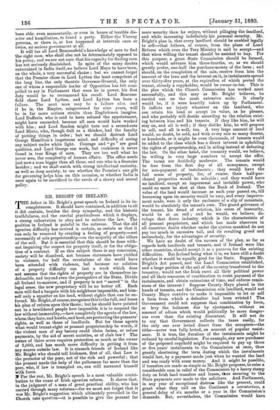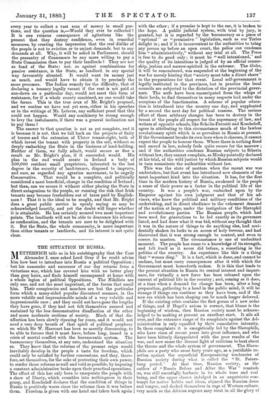MR. BRIGHT ON IRELAND. T HE defect in Mr. Bright's great
speech on Ireland is its in- completeness. It should have contained, in addition to all it did contain, besides the deep sympathy, and the historic truthfulness, and the careful practicalness which it displays, a strong exhortation to obey and to enforce the law. The position in Ireland is painful in the extreme. That the old agrarian difficulty has revived is certain, as certain as that it can only be removed by creating a feeling of property—not necessarily of sole proprietorship—in the majority of the tillers of the soil. But it is essential that this should be done with- out impairing the respect for property itself, or for the obliga- tion of a contract. If on this subject there is any concession, society will be dissolved, not because statesmen have yielded to violence, for half the revolutions of the world have been attended with violence, but because no solution of a property difficulty can last a week which does not assume that the rights of property are in themselves in- Aefeasible, and beyond even the prerogative of the State. Divide all Ireland to-morrow, and if property is not " sacred " in the legal sense, the new proprietary will be no better off. Each man will find a bargain with his neighbour impossible, and him- self only a squatter on his land, without rights that can be en- forced. Mr. Bright, of course, recognises this to the full, and bases his plan of reform upon this thesis ; but he should have pointed out to a bewildered people how impossible it is to suspend the law without immorality,—how completely the agents of the law, whom they hate, and hustle, and hoot, are protecting the peasants' rights, as well as those of landlords. But for these agents what would tenant-right or peasant proprietorship be worth, if the violent men of any barony could claim farms, or refuse payments, by the aid of secret societies, or of club law? The owner of three acres requires protection as much as the owner of 3,000, and has much more difficulty in getting it from any source outside law. It is staunch friends of Ireland like Mr. Bright who should tell Irishmen, first of all, that Law is the protector of the poor, not of the rich and powerful ; that the peasant needs the help of the policeman far more than the peer, who, if law is trampled on, can still surround himself with force.
For the rest, Mr. Bright's speech is a most valuable contri- bution to the cause of Irish agrarian reform. It shows that, in the judgment of a man of great practical ability, who has carried through many reforms—for we must not forget that it was Mr. Bright's suggestion which ultimately prevailed in the Church rate question—it is possible to give the peasant far more security than he enjoys, without pillaging the landlord, and while increasing indefinitely his personal security. Mr. Bright's plan is, that every landlord should be enabled legally to sell—that follows, of course, from the plans of Land Reform which even the Tory Ministry is said to accept—and that when willing the tenant should be assisted to buy. For this purpose, a great State Commission should be formed, which would advance him three-fourths, or, as we should greatly prefer, one-half the purchase-money of the farm ; and should, on the completion of the sale, receive from him the amount of the loan and the interest on it, in instalments spread over thirty-five years, at the expiration of which period the tenant, already a copyholder, would be owner-in-fee. This is the plan which the Church Commission has worked most successfully, and this may as Mr. Bright believes, be carried out on the most extensive scale. It clearly would be, if it were heartily taken up by Parliament. It inflicts no injury whatever on the landlord, who can retain his land or accept its value, as he pleases, and who probably will decide according to the relation exist- ing between him and his tenants. If they like him, he will stay on, and all is well ; if they dislike him, he will propose to sell, and all is well, too. A very large amount of land would, no doubt, be sold, and with every sale so many dozens, or hundreds, or it might be even thousands, of tenants would be added to the class which has a direct interest in upholding the rights of proprietorship, and in aiding instead of defeating the law. On the other hand, the tenantry would, we believe, be willing in very large numbers to accept the offer. The terms are decidedly moderate. The tenants would be free from the first day of all annoyance, except for non-payment of instalments ; they would have the full sense of property, for, of course, their half-pur- chased properties would be saleable ; and they would have no landlord, except an impersonal and invisible power, who could no more be shot at than the Bank of Ireland. The value of the land would increase as each year passed on, till borrowing upon its security would be easy, and every improve- ment made, were it only the enclosure of a slip of mountain, would be absolutely the tenant's own. The grand grievance of the tenant, his dread of eviction, his sense of insecurity, would be at an end ; and he would, we believe, de- velope that fierce industry which is the characteristic of all peasant proprietors, and which has made observers in all countries doubt whether under the system mankind do not pay too much in excessive toil, and its resulting greed and melancholy, for the advantages of security.
We have no doubt of the success of the plan, as far as regards both landlords and tenants, and if Ireland were like other countries, should accept it as a panacea for the existing difficulties. But Ireland being what it is, we have still a doubt whether it would be equally good for the State. Suppose Mr. Bright's Act passed, and the Land Commission established, and a large portion of the soil of the country transferred to the tenantry, would not the Irish exert all their political power and all their resources of combination to resist payment of the instalments, and obtain extensions of time, and enforce remis- sions of the interest ? Suppose County Mayo placed in the hands of tenants, and the Commission sole landlord, would not County Mayo contrive to make it impossible to let or sell a farm from which a defaulter had been evicted ? The Government could not suppress that combination by force, or levy the balances due by ejectments, without an amount of odium which would politically be more danger- ous even than the existing discontent. It will not do to say that Government collects the taxes easily, for the only one ever levied direct from the occupiers--the tithe—never was fully levied, on account of popular resist- ance. It is true, the duration of the instalments might be reduced by careful legislation. For example, any new purchaser of the proposed copyhold might be required to pay up three or five years' instalments to the Commission at once, thus greatly shortening the term during which the instalments would last, by a payment made just when he wanted the land and was ready with some money. And it might be possible, if transfers are made as simple as Mr. Bright proposes, to raise a considerable sum in relief of the Commission by a heavy stamp duty on Irish land transfers and leases, thus securing to the State payments now made to the solicitors. And Parliament, in any year of exceptional distress like the present, could grant what they call on the Continent a moratorium, a general delay of six months or a year in the Commission's demands. But, nevertheless, the Commission would have every year to collect a vast sum of money in small por- tions, and the question is,—Would they ever be collected ? It is one ruinous consequence of agitations like the present that they destroy confidence, even in remedial measures, by creating the impression that the real dislike of the people is not to eviction or to unjust demands, but to any demands at all. Why, it will be asked in Parliament, should the peasantry of Connemara be any more willing to pay a State Commission than to pay their landlords ? They are not so fond of the State; nor, as against combinations for passive resistance, is the State, as landlord, in any special way favourably situated. It would want its money just as much, and would have to obtain it by precisely the same processes. The Indian remedy for the difficulty, that of declaring a tenancy legally vacant if the rent is not paid at sun-down on a particular day, would not meet this form of resistance, for if a whole county combined, no one would take the farms. This is the true crux of Mr. Bright's proposal, and we confess we have not yet seen, either in his speeches or in the writings of Mr. Lefevre, any sufficient proof that this could not happen. Would any machinery be strong enough to levy the instalments, if there was a general inclination not to pay them ?
The answer to that question is not as yet complete, and it is because it is not, that we fall back on the projects of fixity of tenure and the extension of Ulster tenant-right, both of which invest the tenant with property in the soil, without so deeply embarking the State in the business of land-holding. Neither of them, we fully admit, would secure so fine a result as Mr. Bright's plan, if it succeeded, would. His plan in the end would create in Ireland a body of 500,000 resident small proprietors, interested to the last degree in the security of land-tenure, disposed to improve, and sure, as regarded any agrarian movement, to be angrily Conservative. That would be a complete, and politically considered a most beneficial, change in the condition of Ireland ; but then, can we secure it without either placing the State in direct antagonism to the people, or running the risk that Irish tenants may become freeholders out of taxes paid by English- men ? That it is the ideal to be sought, and that Mr. Bright does a great public service in openly saying so may be acknowledged heartily, and yet the doubt will linger whether it is attainable. He has certainly secured two most important points. The landlords will not be able to denounce his scheme as confiscation, and the tenants are sure to be delighted with it. But the State, the whole community, is more important than either tenants or landlords, and its interest is not quite clear.



































 Previous page
Previous page